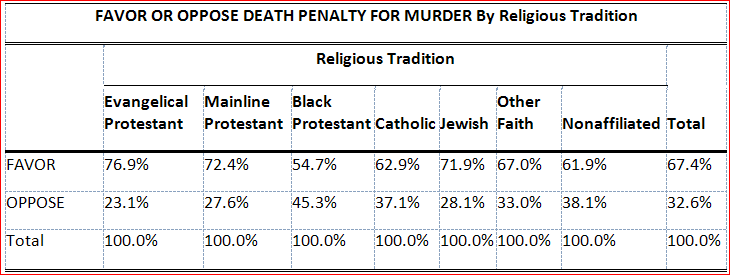In recent months significant attention was paid to the execution of Troy Davis – attention due in large part to the unclear nature of the evidence for his crime.
There were a number of reasons why this case piqued my interest, and one of them was that numerous appeals were made on behalf of Mr. Davis from leading national Christian figures such as former president Jimmy Carter, Rev. Al Sharpton, and Sister Helen Prejean. In addition Pope Benedict XVI, and Archbishop Desmond Tutu also sent in appeals on his behalf. I wondered whether their voices were reflective of the people from the same pews and denominations.
My statistical intuition told me that that could hardly be the case in view of a recent report from the Gallup Organization, one of the most established polling firms in the country.
They showed that Americans support for the death penalty in the case of murder has dropped to 61%. But if we pay closer attention to this trend data, we can see that this support is still higher than the figures seen from 1957 to 1972, the period of the most memorable accomplishments of the Civil Rights Movement. Since most Americans affiliate as Christians, most American Christians in recent decades support the death penalty today.
But I wanted to be certain of this, considering that there is a wide array of Christian perspectives on the death penalty and capital punishment. Using data from the 2010 General Social Survey , one of the leading and most reliable surveys in the nation, we can examine whether there really are differences among Christians on how they view the death penalty, and whether certain Christian groups reflect the voices of public leaders from their same traditions. American religion is a complicated business. A few years ago, me and fellow blogger Mark Regnerus , along with a few other colleagues, published a classification system of contemporary American religious traditions or RELTRAD that offered a way to understand religious differences in American culture while being historically and (to some extent) theologically sensitive in very broad terms. The system includes a few major Christian categories to which I will pay most attention: Evangelical Protestants, Black Protestants, Mainline Protestants, and Catholics. As noted earlier, “Black Protestant” here refers to affiliating with a denomination that is associated with the historical Black Churches in America. One can be a black American and be an evangelical or mainline or Black Protestant or Catholic in the RELTRAD classification system.
So what do we find when we analyze death penalty view by RELTRAD?
Looking solely at the Christian groups, Evangelical Protestants show the lowest opposition to the death penalty at 23 percent, followed by Mainline Protestants at 28 percent, Catholics at 37 percent, and Black Protestants at 45 percent. So if Carter, Sharpton, and Prejean voice official or semi-official views from their respective religious traditions (Evangelical, Black Protestant, and Catholic), we can see here that most affiliates in their traditions don’t agree with them. Notably, even if we look only at the “church-going” crowd (a shorthand way to describe anyone who attends church at least twice a month or more), there are no differences in the overall pattern.
What do we make of this incongruity? While none of the three religious leaders I mentioned are expert theologians, they aren’t uneducated or non-practicing representatives of their faith traditions either. Why is there such limited Christian opposition for capital punishment when various Christian leaders have voiced it?












